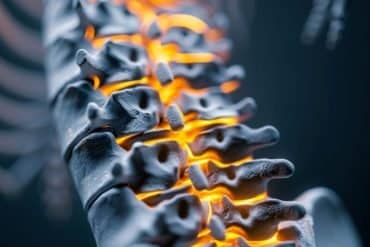Summary: Researchers report an afternoon nap can help us to process unconscious information and enhance cognition.
Source: University of Bristol.
The age-old adage “I’ll sleep on it” has proven to be scientifically sound advice, according to a new study which measured changes in people’s brain activity and responses before and after a nap. The findings, published in the Journal of Sleep Research, support the advice which suggests that a period of sleep may help weighing up pros and cons or gain insight before making a challenging decision.
The Medical Research Council-funded study, led by University of Bristol researchers, aimed to understand whether a short period of sleep can help us process unconscious information and how this might affect behaviour and reaction time.
The findings further reveal the benefits of a short bout of sleep on cognitive brain function and found that even during short bouts of sleep we process information that we are not consciously aware of.
While previous evidence demonstrates that sleep helps problem solving, resulting in enhanced cognition upon awaking; it was not clear whether some form of conscious mental process was required before or during sleep to aid problem solving. In this study, researchers hid information by presenting it very briefly and “masking” it – so it was never consciously perceived – the masked prime task. The hidden information, however, was processed at a subliminal level within the brain and the extent to which it interferes with responses to consciously perceived information was measured.
Sixteen healthy participants across a range of ages were recruited to take part in an experiment. Participants carried out two tasks – the masked prime task and a control task where participants simply responded when they saw a red or blue square on a screen. Participants practiced the tasks and then either stayed awake or took a 90-minute nap before doing the tasks again.
Using an EEG, which records the electrical activity naturally produced in the brain, researchers measured the change in brain activity and response pre-and-post nap.

Sleep (but not wake) improved processing speed in the masked prime task – but not in the control task – suggesting sleep-specific improvements in processing of subconsciously presented primes.
The findings suggest that even a short bout of sleep may help improve our responses and process information. Therefore, the results here suggest a potentially sleep-dependent, task-specific enhancement of brain processing that could optimise human goal-directed behaviour.
Importantly, while it is already known that the process of acquiring knowledge and information recall, memory, is strengthened during sleep. This study suggests that information acquired during wakefulness may potentially be processed in some deeper, qualitative way during sleep
Dr Liz Coulthard, Consultant Senior Lecturer in Dementia Neurology at the University of Bristol Medical School: Translational Health Sciences, said: “The findings are remarkable in that they can occur in the absence of initial intentional, conscious awareness, by processing of implicitly presented cues beneath participants’ conscious awareness.
“Further research in a larger sample size is needed to compare if and how the findings differ between ages, and investigation of underlying neural mechanisms.”
Funding: Medical Research Council funded this study.
Source: University of Bristol
Publisher: Organized by NeuroscienceNews.com.
Image Source: NeuroscienceNews.com image is in the public domain.
Original Research: Open access research for “Nap‐mediated benefit to implicit information processing across age using an affective priming paradigm” by Netasha Shaikh and Elizabeth Coulthard in Journal of Sleep Research. Published July 23 2018.
doi:10.1111/jsr.12728
[cbtabs][cbtab title=”MLA”]University of Bristol”Daytime Naps Help Us Acquire Information Not Consciously Perceived.” NeuroscienceNews. NeuroscienceNews, 4 October 2018.
<https://neurosciencenews.com/daytime-nap-information-9956/>.[/cbtab][cbtab title=”APA”]University of Bristol(2018, October 4). Daytime Naps Help Us Acquire Information Not Consciously Perceived. NeuroscienceNews. Retrieved October 4, 2018 from https://neurosciencenews.com/daytime-nap-information-9956/[/cbtab][cbtab title=”Chicago”]University of Bristol”Daytime Naps Help Us Acquire Information Not Consciously Perceived.” https://neurosciencenews.com/daytime-nap-information-9956/ (accessed October 4, 2018).[/cbtab][/cbtabs]
Abstract
Nap‐mediated benefit to implicit information processing across age using an affective priming paradigm
Understanding how sleep‐related information processing affects behaviour may allow targeted cognitive enhancement to improve quality of life. Previous evidence demonstrates that implicitly‐presented cues are processed during subsequent sleep, resulting in enhanced cognition upon waking. We used a masked priming task to investigate this further. To assess sleep‐mediated effects on reactions to implicitly presented primes, participants performed an Affective Priming Task pre‐and‐post 90 min of sleep, compared with an equal period of wakefulness. The Choice Reaction Time Task—a similar binary choice task but without the implicit aspect—was used as a control. Sixteen healthy participants across a range of ages were tested and sleep monitored using electroencephalogram. In stark contrast to the control task, in the Affective Priming Task reaction times significantly improved across all prime types after sleep, but not an equal period of wake. There was no significant change in reaction times on Choice Reaction Time Task after wakefulness or sleep. Rather than a general suppression of all primes, the data are more in keeping with specific strategic optimisation of prime processing during sleep. We plan future work to probe the mechanisms and neuroanatomical substrate of sleep‐mediated prime processing.






